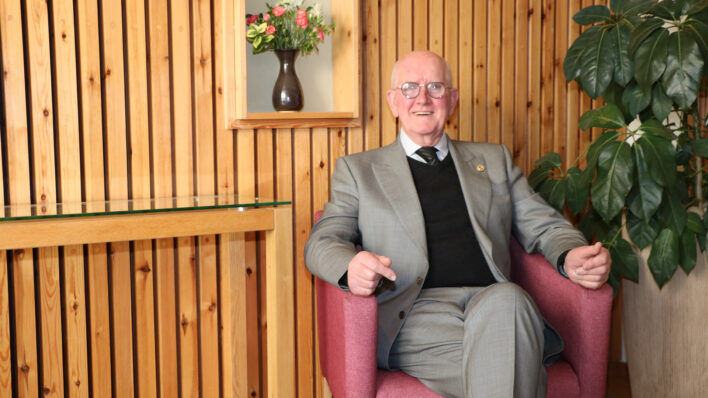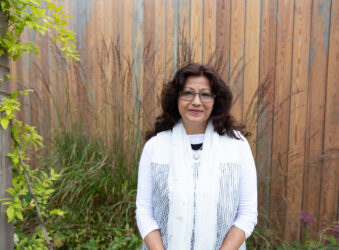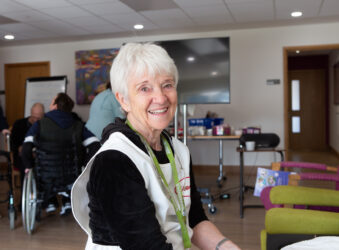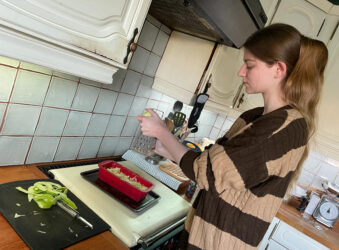Charity Volunteer
Robert Barnes
What makes you proud to be part of the Charity?
I think it’s working alongside such an amazing team of people, not just on the Inpatient Unit but certainly on there too – because it doesn’t matter when I go in, what shift I am doing, who I am working with, they all greet me with a smile.
What do you do on the Inpatient Unit?
I cover Reception on Saturdays and Sundays once every two weeks. For example, I order taxis to collect drug boxes, I answer the phone, I deal with patient’s relatives queries, I deal with pharmacy queries, I meet and greet patient’s families and I meet and greet patients. I find each day on the Inpatient Unit very different.
The clinical staff are busy dealing with patients – they could be washing them, giving them medicines, so, for them to constantly have to answer the phone or let people on to the ward can be very difficult – that’s why I volunteer.
If patients’ family and friends are coming in for the first time, I will take them around the Inpatient Unit and show them where everything is, the kitchen, the tea, coffee facilities, The sitting room, and our wonderful gardens. If they want a quiet moment on their own, then they can do so.” If they need to know anything else, they can come back and see me.” Sometimes I sit with patients and their families and offer an empathetic ear. I also make lots of tea, as well you know, we love our tea and cakes at the Hospice”.
I understand how the relatives might feel because I have been in a similar situation myself. I will make them tea because sometimes relatives and friends, simply don’t want to leave their loved one’s side. Especially when the time gets close. We look after our patients but we also, very much look after the families and the friends and that to me is so important. It’s looking after them all and I just enjoy doing it.
Sometimes when I’m out in the community, perhaps doing ambassadorial work, which I really enjoy or maybe weeks or months later, I will bump into someone and they’ll say, “I know you, you looked after my mother, or you looked after my father, or you looked after my cousin.” They will ask how I am and how everyone at the hospice is.
What is your personal connection to the Hospice?
My wife, Lisa was cared for at the Hospice [on Mill Road]. We spent eight days and eight nights there. I think Lisa and I were quite fortunate because we came and looked around the Hospice before we came in. Lisa had made her mind up that, that was where she wanted to die.
When we came in it was almost like coming home. We felt very secure. I spoke with the medical team, and said that Lisa still wanted me to do her personal care, they were very happy for me to do this.
The first night I stayed on a recliner chair and then after that they found me a bed. I slept next to Lisa so, if she wanted me to help her in the night, I was there.
I’m sure they thought we were a very strange couple, because we didn’t stay in the Hospice very much during the day. Lisa wanted to get dressed every day, so we would go out onto Mill Road and have a coffee or a tea in one of the many cafés. Lisa would be in a wheelchair, with her oxygen and I would gently push her. The clinicians would give me Lisa’s medication for however long we were going to be out. It was quite something.
How do you think the new Hospice compares to the old one?
We didn’t move to the new hospice be the same – we moved to embrace the huge changes here. But if you are asking me about the love that has come with it, the attention we give to our patients, that too has come from the old Hospice, when Lisa was so very ill, we were looked after so well, I called them all angels and I still do. It doesn’t matter if it was a cleaner or a consultant, they were absolute angels. They worked so hard.
When I come weekends there is one particular doctor who will ask me, “Robert can I make you a drink?” and I’ll say, “I’m the volunteer here, I should be making you a drink” and she will make me a drink and perhaps a couple of crumpets. We have a very good working relationship.
What’s your call to being a volunteer?
I never thought I would be doing this if I’m honest – because you don’t. Before Lisa was ill, we worked in our own business together. I was so busy it takes over your life.
The reason I started the fundraising, was because Lisa and I had discussed this. She had said “You must do something for the Hospice when I’m gone, they have looked after us both so very well”. I said, “I agree, they have, and I will”.
I then decided that £100,000 was the amount I should raise, so I announced this on live radio just six weeks after Lisa passed away. Afterwards I thought that was a silly thing to say really. But I did what I could with lots of help from friends and family, holding lots of fundraising activities and initiatives in the community for ‘Lisa’s Fund’.
Four years later we had reached the £100,000, so I was very pleased and relieved we had achieved our target. Another year we had raised £125,000! At the present time Lisa’s fund stands at £170,000.
No amount of money can buy the care and the love that those guys [staff at the Hospice] showed us while we were in the hospice. No amount of money will ever pay for that. So, I just think that this is where I am now. I feel very comfortable.
I still do a little fundraising. I’m a Rotarian and I do other fundraising activities too. I look after my grandchildren, so I have a full life. But the Hospice is a very, very important part of my life, I cannot envisage the day I will stop working here. When I walk in here it’s like walking into my second home. I feel very comfortable, everybody makes me feel welcome and at home and I feel very privileged to be part of this team.





